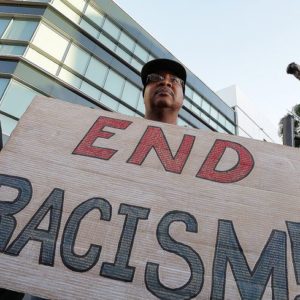Racism wears many coats, coats that may look different, but all with the same hidden lining. The coat’s exterior can be attractive, appearing to reflect cherished values and attitudes like fairness and safety. But look underneath and you’ll find the motivation to maintain the racial status quo and keep people of color “in their place.”
Criminal justice legislation, for example, that supports tough-on-crime attitudes, and encourages mass incarceration, often has an outer patina that covers a more sinister motive. Each of these can have a specter of looking out for the public good, protecting public safety, and caring for the unfortunate victim.
Voter suppression, masquerading as a defense against voter fraud, is the most obvious example currently in the news. Who could be against voter integrity? Voter fraud, which is virtually non-existent, is now used as an excuse across the United States to promote approximately 250 voter-suppression bills put forth in 43 states. Georgia’s newly-elected Sen, Raphael Warnock calls them “Jim Crow in new clothes.”
Recent legislative iterations may be more sly than past poll tax and requirements that people of color recite the Declaration of Independence, but blatant or not, the current efforts do the same. They alter the rules of voting in favor of the White majority.
Georgia’s legislature has been the poster child of this effort. Under the guise of maintaining voter integrity, recently passed legislation in the Georgia legislature limits early-voting opportunities, constricts access to vote-by-mail, and impose more voter identification.
The law makes it a crime to provide water or food to people waiting in line to vote, a not very subtle effort directly specifically at the Black population. In a recent lawsuit contesting inequity in voting polls, “the average wait time in Georgia after polls were scheduled to close was six minutes in neighborhoods that were at least 90 percent White, and 51 minutes in places that were at least 90 percent non-White.”
Racism is often portrayed as White protesters snarling at civil rights activists or at Black children arriving at a White school for the first time. If we look now it could show up in state capital buildings across the country.
It may be the case, however, that the Georgia legislature, among others, has overplayed its hand. Racist legislation in 2021 may meet a stronger and more biracial backlash than in previous generations. The civil rights movement of the 1960s, 70s, and 80s was primarily an African American effort. George Floyd’s death, along with a series of other atrocities committed against minority populations, has awakened a new portion of the White population to the widespread nature of racism.
An expanding sliver of White majority voters has responded to the message that people of color experience systemic disadvantages. The combination of these voters along with a high turnout of Black voters was a critical factor in the recent Democrat wins at the presidential and senatorial level in Georgia.
Meanwhile, Republican legislators, reacting to this outcome as well as responding to the dictates of the former president, have resorted to harsh, racist legislation. Their blunt instruments, however, may harm some of their own voters and certainly will stoke a strong and emotionally laden response from their opponents. Progressive organizations and voting-rights groups are likely to react aggressively to the Republican legislation and use their actions as a branding mechanism.
A significant portion of Americans believes racism is called out unduly and is exaggerated. They cry that we need to ignore small slights and leave culture as it is. The same individuals may be surprised to learn that Blacks were excluded from the Civilian Conservation Corps and numerous other programs during the Franklin Delano Roosevelt administration. That the GI Bill following World War II was a Whites-only program. That minorities were widely not allowed to purchase new development houses during the great explosion of homeownership in the middle and latter part of the last century. That illegal drug use is as common among Whites as it is with Blacks and the war on drugs was and is decidedly racist. That mass incarceration overwhelmingly decimated Black men and many Black communities.
Voter suppression wears a nice exterior, Iike protecting voter integrity, but it, like the Jim Crow actions that proceeded it, were all motivated by the inner lining of keeping minorities on the bottom rung of society.

